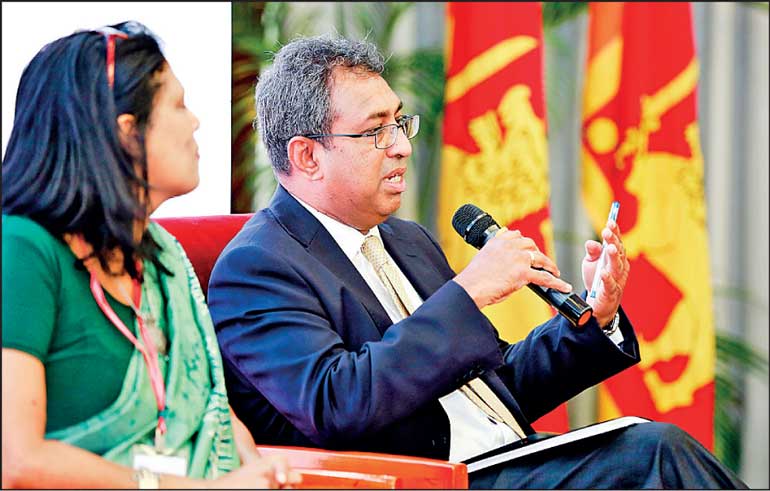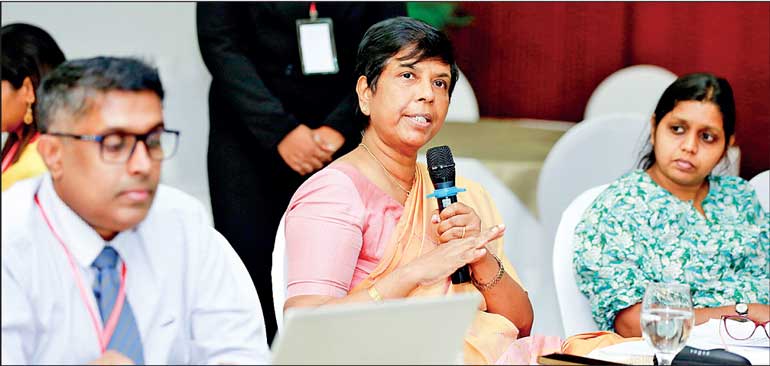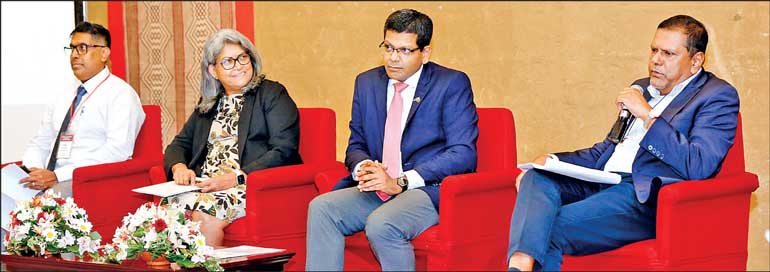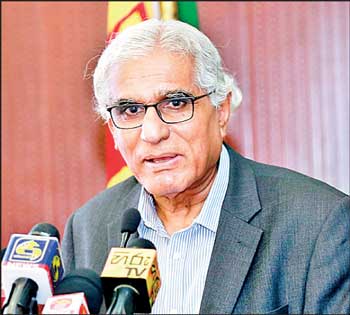Tuesday Mar 03, 2026
Tuesday Mar 03, 2026
Tuesday, 19 December 2023 00:00 - - {{hitsCtrl.values.hits}}



 The Centre for Poverty Analysis (CEPA) successfully concluded a landmark symposium, “Poverty alleviation in an era of economic crisis,” held on 29 and 30 November at BMICH, Colombo.
The Centre for Poverty Analysis (CEPA) successfully concluded a landmark symposium, “Poverty alleviation in an era of economic crisis,” held on 29 and 30 November at BMICH, Colombo.
The symposium, which brought together distinguished experts, practitioners, and stakeholders, emerged as a pivotal platform for sharing knowledge, fostering insights and discussions on combating poverty amidst Sri Lanka’s economic challenges.
The event witnessed a convergence of experts and thought leaders, delving into critical themes that significantly impact poverty reduction strategies. Renowned keynote speakers, Central Bank former Governor Dr. Indrajit Coomaraswamy, and Asian Development Bank (ADB) Regional Lead Economist Dr. Rana Hasan, delivered their opinions on how the country’s economy should be steered to reach economic stability and growth during the next few years to enable poverty reduction.
Dr. Coomaraswamy highlighted the country’s struggle to sustain poverty alleviation efforts amid cyclical economic instability.
Coomaraswamy emphasised Sri Lanka’s underperformance in repeated IMF programs, fiscal dominance over monetary policies, and unsustainable budgetary operations. The graduation to a middle-income status adversely affected the country, leading to a loss of donor support and concessions. Recent stabilisation efforts and legislative changes aim to strengthen fiscal rules and manage liabilities strategically, while recommendations span from continuation of stabilisation efforts and introducing necessary structural reforms. He cautioned against the danger of deviation from the reform agenda in an election year pointing out that the society has no buffers left to absorb major economic shocks.
Dr. Rana Hasan reiterated the importance of getting back to positive economic growth and explain in details the necessary productivity improvements Sri Lank should pursue to ensure economic growth
The event also saw the screening of the documentary “Voices of Poverty, Visions of Youth: An Exploratory Study” highlighting aspirations of the youth, empowerment, education and migration, followed by a panel discussion.
Retrospect of Poverty
The initial plenary session on the Retrospect of Poverty, led by a panel exploring Sri Lanka’s poverty drivers and associated implications, delved into insights shared on successful policies and strategies that reduced poverty significantly. The necessity for reforms to stimulate economic growth was highlighted, emphasising the importance of market liberalisation and global integration. Crucial aspects like land ownership, technological advancements, and fair access to market opportunities emerged as key in addressing poverty. Robust data collection methods were emphasised to bridge macro-micro gaps for more effective poverty reduction strategies. The session concluded by stressing the need for holistic approaches, governance reforms, and comprehensive implementation strategies to achieve sustainable poverty alleviation.
The discussion on establishing a comprehensive social protection system underscored the critical need for social protection, Targeted approaches addressing social assistance, care services, and labour markets were emphasised to combat crisis-related challenges. The session stressed the importance of community-based responses, recognising communities as vital in real-time crisis management. It highlighted the necessity for a coherent policy roadmap, Government commitment, and inclusive targeting methods, acknowledging communities’ roles in transparent processes. Overall, it emphasised universal social protection’s importance, practical implementation strategies, and integrating community-based solutions into an adaptable framework.
Another session explored crises through a feminist lens, spotlighting increased responsibilities faced by working women, especially during crises, addressing issues of poverty, marginalisation, and resilience. It noted the exclusion of women from policymaking processes, resulting in job losses and increased vulnerability, particularly in labour reforms and economic decisions. Discussions highlighted challenges faced by migrant women, their limited support access, and ensuing debt traps. The session also addressed women’s political participation, representation in decision-making spaces, and the need for inclusive policies and gender-aware reforms to foster empowerment and meaningful engagement.
In the agricultural transformation discussion, crucial themes emerged, highlighting policy reforms to address food crop sector challenges, focusing on liberalising land markets, farm size and productivity, and the need to limit the Government interventions to rectify market failures. Donors stressed transitioning from emergency to development-oriented approaches, advocating productivity, modernisation, and gender inclusion while prioritising sustainable reforms. Climate-smart agriculture was emphasised for addressing climate change impacts, necessitating strategic and structural changes. Persistent poverty in the plantation requires innovative approaches including land rights of workers, technological modernisation, product diversification and resource-efficient practices.
MSMEs for economic recovery
The session on MSMEs for economic recovery highlighted inequality within these enterprises, focusing on challenges like limited access to technology and credit. The rising adoption of digital technologies was recognised as a significant trend. Discussions delved into export trade barriers, including competition among regional counterparts, quantity issues, and quality certification gaps. A gender perspective on the National SME Policy revealed disparities in considerations for women entrepreneurs and outdated data’s impact on policy decisions. Recommendations focused on technological exposure, mentorship, value addition, policy revisions, updated databases, and societal mindset shifts. Additionally, suggestions emphasised absorbing market trends, facilitating resource access, and learning from global developments for MSMEs’ growth.
The session on inequality walked the audience through the evolution of the economic theory and empirical findings on the relationship amongst economic growth and poverty and inequality. It pointed out economic growth is necessary but not sufficient for reducing the mass-scaled poverty in the country. The session identified five major risks that may prevent Sri Lanka from getting to a higher path of economic growth: i) deviating from the reform agenda in the election year; ii) lack of public support for reforms due to non- transparent and non-consultative approach of the Government; iii) lack of or partial implementation of reforms; iv) corruption vulnerabilities; and iv) increasing inequality. The session emphasised the importance of implementing supplementary policies to reduce inequality while pursuing economic growth as a means to reduce poverty.
Over two engaging days, the symposium navigated through multifaceted discussions addressing macroeconomic implications, social protection mechanisms, feminist approaches in crises, agricultural transformations, and the resilience of Small and Medium Enterprises (SMEs). Thought-provoking plenary sessions dissected the intertwining factors of economic crises, poverty, vulnerability, and the critical role of inequality in poverty reduction.
The recommendations and insights generated from this symposium hold immense potential in guiding policies and frameworks towards a poverty-free Sri Lanka.